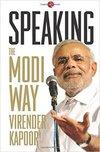
What is the one quality the Indian Prime Minister Narendra Modi has that most of his predecessors lacked?
Excellent oratorial skills, points out Virender Kapoor.
Inspired by the charisma and eloquence of Modi, management guru Virender Kapoor recently released the book Speaking the Modi Way, in which he talks about how you can become a great leader like him.
Presenting an excerpt from the book for you to read:
How to Become a Great Orator
 If oratory is an art which can be acquired and gradually perfected, what are the basic skills that one needs to focus upon?
If oratory is an art which can be acquired and gradually perfected, what are the basic skills that one needs to focus upon?
Simply put, good oratory boils down to understanding what to say, how to speak and how to articulate your presentation.
What to say
Now this is where most people go wrong.
You may have a great voice, a very high level of confidence, your body language may be fine and you may be speaking from the heart — but if your content isn’t relevant and solid, you will be a disaster.
You should research your facts and figures and do enough homework while preparing your speech.
Read and research: Never take a shortcut with regard to this.
Prepare your speech well. You must read all relevant material and cross-check facts before you finalize your draft.
Make it a habit to write down your script. If not the entire speech, at least jot down the major points you plan to make as well as what you plan to say under each point.
Cater to the audience: Keep the context in mind while developing content. Who is your audience? Whom are you addressing?
What is the occasion? What exactly do you want to convey and achieve?
These are some of the questions you must answer before you decide on the content. For instance, if you are addressing a women’s forum, your content would be very different from a speech you might give to college students on the same topic.
Use metaphors, quotes, analogies and similes: This is extremely potent stuff that can augment your content to a great extent.
Quotes by great people are available on almost every subject.
The art lies in picking up the right ones for your content.
Metaphors and similes act as a bridge between your ideas and your audience. Metaphors can effectively convey some very complex issues in a simple and straightforward way.
Be a storyteller: ‘All human beings have an innate need to hear and tell stories and to have a story to live by… Religion, whatever else it has done, has provided one of the main ways of meeting this abiding need,’ said Harvey Cox.
Everyone wants to listen to a story. There is a child in everyone. An abstract or a story-based example, or a portion from history or mythology can be a very effective way of enhancing your content. People listen to these stories in rapt attention.
Mix styles and borrow ideas: Shah Rukh Khan once said in an interview that he could pick up styles from great actors of the past and portray them in his own way, in his own style, making it look original — and that is what ingenuity is.
Speak from the heart: This is easier said than done. The speaker must be convinced about the topic, only then can he speak from the heart.
When you speak from your heart, you appear genuine and you connect straightaway with your audience. Your appeal must sound genuine and that can happen only if you imbue it with emotion.
Define the purpose of the speech: A speaker must be clear regarding the purpose of the speech from the very onset. And he must stick to this core purpose throughout his speech.
A good orator keeps his focus on the result that he needs to achieve. Quotes, audio, video clips and humour should be used intelligently.
Without humour a speech can become dry, boring and monotonous.
Light humour at an appropriate moment can be very refreshing for the audience.
Use clean humour; never have a laugh at anyone’s cost. Also, don’t insert quotes or clips that are out of context. Also, make sure these do not distract the audience or inadvertently shift the focus of the speech.
Be articulate: Put your thoughts across logically and systematically so that your speech has a definitive smooth flow. One topic should systematically lead to the next.
As far as possible a speaker should never jump from topic to topic in a manner that sounds abrupt. This confuses the audience and may very well throw you off-track too. So identify the main highlights of your speech and then connect them to achieve a proper flow.
Use facts and figures: These make your speech effective and authentic.
Ensure that you do not quote figures that could be challenged or may be wrong; triple-check your facts beforehand. Facts and figures at your fingertips can earn you a lot of respect.
***
How to speak
This aspect of oratory deals with the way a person speaks — diction (how correctly and clearly each word is word is pronounced), the modulation of voice, body language etc. It is all about theatrics –how you make an impact and how you present yourself. To achieve this you need to do the following.
Practise as much as you can: This is most essential. The more you rehearse the better you get.
Write down your script, memorize the points and practise in front of a mirror, again and again and again.
Building confidence: If you are well-rehearsed, you will automatically become confident.
Your first public address may be a little shaky, you may be a little apprehensive and nervous. But this is quite natural. Don’t worry about failure, as failure takes you towards success.
Watch your own recordings: Use your mobile phone or any other means to record your rehearsals and even your public speaking assignments.
When you watch your performance you will understand your shortcomings.
Try to keep all your recordings intact and track your progress after each presentation — note three weak points and three strong points. Work on your weak points to ensure that you do not repeat your mistakes and retain your strengths.
Voice modulation: Do not speak in one tone as it becomes monotonous — a change in frequency or pitch while speaking keeps the audience alert and receptive.
Be audible enough for your audience in the last row to be able to hear you; if they cannot hear you, adjust your mike.
Remember, a lower pitch sounds better; avoid sounding shrill as far as possible. Moderate your volume in case you are speaking loudly. And finally, speak each word clearly; do not mumble.
Watch your pace: Audiences are usually comfortable with a person who speaks at around 125 words per minute. Therefore, keep your range between 110 to 140 words per minute.
Some people speak very fast and the audience cannot grasp what they are saying.
On the other hand, speaking very slowly can put the audience to sleep and make your discourse very boring.
Say the same thing in hundred different ways: Now this is not easy. A good orator can explain the same point in several different ways. And this is a superb art worth acquiring.
An orator is the teacher and the audience his students. A great orator can also say the same thing to different audiences in different ways.
When he addresses schoolchildren he uses one example and when addressing senior officers from the corporate world he uses a different example to convey the same point. The greatest orator can say the same thing to the same segment of the audience differently.
Avoid using a crutch/prop: Ever seen great speakers like Obama, Modi, Fidel Castro or Opera Winfrey use a PowerPoint?
They speak from the heart as much as from memorised text. They speak into the mike and look into the camera. They also don’t use too much audio-visual input. Yet they have changed history and motivated millions.
With regard to oratory, a simple axiom says it all: if you need to use PowerPoint, then there is no power in your point!
The power of a pause: A pause can be used in two ways. Whenever there is applause or the audience laughs at a joke, the speaker must pause and wait for the applause or laughter to finish. A speaker can also use a pause very effectively to emphasise a point.
Indian veteran actor Dilip Kumar said an interview that he gradually learnt the power of ‘silence’ during his acting career.
When to keep quiet for a very short period between two sentences was an art he developed very effectively. This way you can synchronize the expectations of your audience with your speech and thought. It also makes the audience more attentive.
This has to be done deliberately, intelligently and only at a few critical points of the discourse.
Listen to the radio and watch TV: Listen to good radio channels to see how different anchors, debaters and panelists speak.
Observe their different styles, their punctuation pauses, their clarity of thought, their diction and pronunciation. Good TV channels select their presenters and newsreaders very carefully.
Therefore, they speak and pronounce not only appropriately but also correctly.
Participate in debates: If you can find a partner to debate with, practise with them.
Take the initiative and participate in school or college debates. When you are able to effectively argue in real time it will give you a tremendous boost of confidence.
You cannot carry a written speech onto a debate podium and have to respond on the spot; so practising with a good debating partner will improve your skills in speaking extempore.
The fine art of stagecraft and drama: How many of us examine the podium a day before we speak? Very few.
Great and effective speakers study a venue for its acoustics, colour scheme, the best places to speak from, entrances and exits, the door and windows.
They learn the art of keeping their audience charged. They spring surprises appropriately.
Leadership fails when leaders sympathize rather than empathize. Sympathy is, ‘I know how you feel,’ while empathy is, ‘I feel how you feel.’
Good speakers use rhetoric to convince the audience that they empathize and not sympathize with them.
Handle unexpected issues smoothly: You may have rehearsed well and you may be very confident but unexpected problems can pop up while you are speaking in front of the audience. For instance, there could be a sudden power breakdown.
Don’t panic. If the power returns quickly, resume from where you left off. If it looks like it is going to take longer, then you can even declare a break.
The bottom line is that you must remain cool during any such mishap.
[source;rediff.com]





















